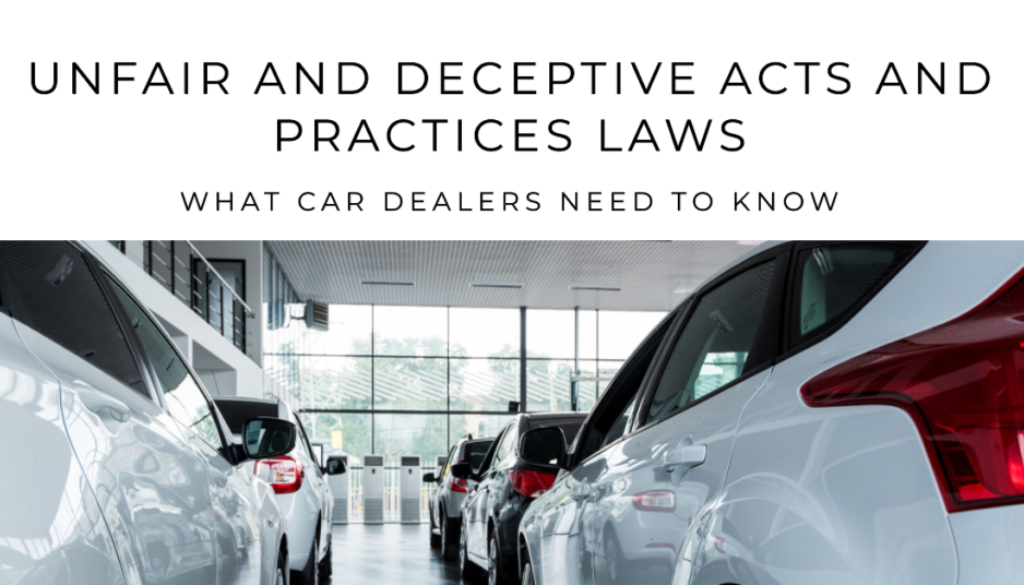Unfair and Deceptive Acts and Practices Laws: What Car Dealers Need to Know
Unfair and Deceptive Acts and Practices Laws. What Car Dealers Need to Know
Car dealerships may not be aware of the extent to which Unfair and Deceptive Acts and Practices laws (UDAP) cover almost every aspect of their business, including advertising and marketing to customers, conversations with staff, and how deals are handled. Any member of staff who interacts with or markets to the public can create liability for the dealership and themselves.
Unfair and deceptive acts and practices (UDAP) laws are state laws that prohibit businesses from engaging in conduct that is unfair, deceptive, or misleading to consumers. These laws are designed to protect consumers from fraud, misrepresentation, and other unethical practices in the marketplace.
- Product on sale
 QuickBooks Online SubscriptionFrom: $27.00 / month
QuickBooks Online SubscriptionFrom: $27.00 / month
Car dealers are subject to UDAP laws, as they are considered to be sellers of goods and services to the public. However, some car dealers may not be aware of the scope and implications of these laws, and may unknowingly violate them in their daily operations. Here are some things that car dealers may not know about UDAP laws:
– UDAP laws vary by state. Each state has its own UDAP statute, which may have different definitions, standards, and remedies for unfair and deceptive acts and practices. Some states may have more specific or stricter regulations for car dealers than others. For example, some states may require car dealers to disclose certain information about the vehicle’s history, condition, or warranty, while others may not. Therefore, car dealers should familiarize themselves with the UDAP laws of the states where they operate and sell vehicles.
– UDAP laws apply to both new and used cars. Some car dealers may think that UDAP laws only apply to new cars, or that they have less liability for selling used cars. However, this is not true. UDAP laws apply to all transactions involving goods or services, regardless of whether they are new or used. Car dealers have a duty to disclose any material facts or defects that may affect the value or performance of the vehicle, and to avoid making any false or misleading representations or omissions about the vehicle.
– UDAP laws cover a wide range of practices. Some car dealers may not realize that UDAP laws cover not only the sale of the vehicle itself, but also any related services or products that they offer or provide to consumers. For example, UDAP laws may apply to financing, leasing, warranties, service contracts, repairs, trade-ins, advertising, and more. Car dealers should ensure that they comply with UDAP laws in all aspects of their business dealings with consumers.
– UDAPs are enforced by both federal and state governments, with the Federal Trade Commission and state attorneys general pursuing UDAP claims against auto dealerships.
-UDAP statutes are constantly evolving, and even unresolved customer complaints can lead to a potentially devastating lawsuit. A common element in enforcement actions and court cases against dealerships is the perception that the dealer was dishonest with a consumer, intentionally or not.
– UDAP laws can result in significant penalties. Some car dealers may not be aware of the potential consequences of violating UDAP laws. Depending on the state and the severity of the violation, car dealers may face civil lawsuits from consumers or regulators, criminal prosecution, fines, injunctions, restitution, damages, attorney fees, or revocation of their license. In some cases, car dealers may also be liable for punitive damages or treble damages (three times the actual damages), which are intended to deter and punish willful or malicious conduct.
-There are many things all customer-facing dealership employees should know about UDAP statutes, such as the fact that no customer complaints are necessary and even inadvertent violations are actionable, and that even innocent misrepresentations can be actionable. Dealership staff may assume that only written agreements are enforceable, but UDAP claims can be founded on oral misrepresentations, oral promises, failure to disclose, and ambiguous statements that are technically accurate but deceptive.
-Oral misrepresentations may violate UDAP statutes even if they are subsequently corrected by a written disclosure statement. The seller’s good faith does not excuse technical noncompliance and may not be a viable defense. Unilaterally crediting the consumer’s account with the amount sought in a lawsuit does not moot a UDAP claim, nor does a defendant’s offer to refund the consumer’s money after a suit has been filed. (“20 Things to Know about the UDAP – CBT Automotive Network”) In addition, literally true statements can be deceptive, and it is no defense to a UDAP claim that the challenged practice is engaged in throughout an industry or is customary business conduct. To avoid potentially costly litigation, dealerships must ensure that all staff members are aware of the potential liability under UDAP statutes.
– UDAP laws can benefit car dealers as well as consumers. Some car dealers may view UDAP laws as a burden or a threat to their business. However, this is not necessarily true. UDAP laws can also benefit car dealers by creating a level playing field in the industry and enhancing their reputation and credibility with consumers. By complying with UDAP laws, car dealers can avoid costly litigation and penalties, build trust and loyalty with their customers, and gain a competitive edge over less scrupulous dealers.
In conclusion, UDAP laws are important for car dealers to know and follow. They protect consumers from unfair and deceptive acts and practices in the sale of vehicles and related services or products. They also promote fair competition and ethical standards in the car industry. Car dealers who comply with UDAP laws can benefit from increased customer satisfaction and retention, as well as reduced legal risks and liabilities.
Can You Deduct Your Car Lease Payments on Your Taxes?
My Business Web Space may earn an Affiliate Commission if you purchase something through recommended links in this article.

